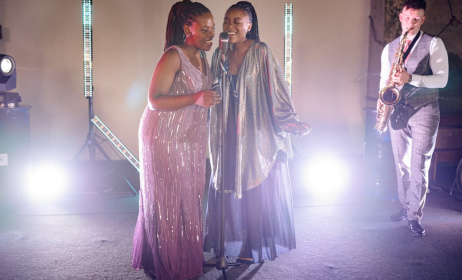A Nigerian at Berlin's Pop-Kultur festival
Germany’s first pop culture festival held in the concluding week of August. Berlin, city of such varied art forms and home to the huge, hugely popular club Berghain, was set as host. The club itself hosted the concerts of the festival; the nearby Buhnenservice held workshops.
 A ticket stand at the venue of the Pop Kultur Festival.
A ticket stand at the venue of the Pop Kultur Festival.
The format was simple: Buhnenservice, normally an opera house, held workshops. By night the festival moved to Berghain, where several artists occupied the many stages of the club, treating fans and revellers to strains of electronic music.
The festival appeared to traffic in irony: named pop culture, the music mostly available was techno music, hard, pounding techno music, ferried to the listener’s ears by the excellent speakers of the Berghain.
‘Pop Kultur’ as the name of the festival was itself ironic. It toyed with the idea that German words differ from English ones with the consonant ‘k’. Pop culture in English becomes pop Kultur in German. To further the conceit, the organisers made up several interesting ‘facts’ relating to pop culture. Everything from twerking to folk music, according to the festival, began in Berlin. Short videos supporting the conceit are on YouTube.
Attendees were mostly Germans or resident in the country, diversified by the presence of some ten participants selected from around the world via an application process. Four participants emerged from Africa, three musicians and a writer. For this group the sounds of Berlin nightlife were alien. It may have presented a challenge.
A different challenge came up with during the workshops. With most of the group from Africa bound by the English language, the dominance of German for the workshops was unfortunate. Doubly so for this reporter who attended classes on composing electronic music because they were the only English-helmed class during a certain session.
Nonetheless, some sessions were revealing. A session on music exchange revealed that though the world may frequently be referred to as a global village, music transfer between Europe and Africa is still a tricky terrain. The term ‘world music’ is used ashamedly, if at all, but the gaps remain. During a session on record labels, an indie label owner appeared to have never considered promoting an African artist.
These differences provided the festival with tension, charm, and in the case of the festival’s workshop on cultural exchange, a vastly enjoyable and penetrating session. The session sought to answer the question ‘How should international exchanges be structured to avoid exoticism and intercultural euro-centrism?’ By its end, no clear solution was reached but the discussion had been opened up.
Yet the most enlightening bit and certainly most humorous segment of Pop Kultur 2015 came at the beginning. Tim Renner, Berlin’s Secretary of State for Culture, gave the opening talk. Said to be quite a controversial figure in the city, Renner spoke about the need to protect artists and art spaces in Berlin.
The city, he said, was a draw for a diverse set of people because of its artists. Unfortunately, the pull to the city pushes prices upward, making it harder for artists to afford Berlin's cost of living. ‘This is why clubs like the Berghain have to be defended,’ he said. ‘The more Berlin prospers the more it's hard for artists to live here.’
According to Renner, 61 percent of Berlin industry is drawn from creativity and tourism, with 120,000 people moving to Berlin every year. And more than 25 percent of people came to Berlin after the war. In Renner’s portrait of Berlin, deprecation merged with hagiography: The city used to be broke but it’s great; it once actively encouraged artists, now it’s chasing them.
No one among his audience would have argued with the man. They probably know less than he does about the topic. Some, however, may have argued with the festival’s music selection for a pop festival.
Artists like British hip hop group Levelz provided some variety and the first few songs of Matthew Herbert, with a lady vocalist, were rhapsodic. (Sophie Hunger's sober, sobering rendition of Prince's 'Purple Rain' was a highlight.) But instant musical pleasures for the ears of an outsider were few and far. "That's what is popular in Berlin nowadays," said Brahim Wone, a Senegalese guitarist.
Indeed. A first-time festival caters to its own first and so it was with the essentially enjoyable Pop-Kultur 2015. Maybe in 2016, older and a little more secure, Pop-Kultur Berlin may feature an artist instantly recognisable to the African ear, even as it provides more Euro-traditional fare? No one knows—but there’s certainly a lot of time to hope.























Commentaires
s'identifier or register to post comments